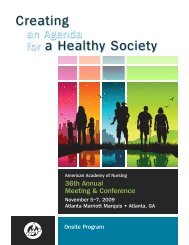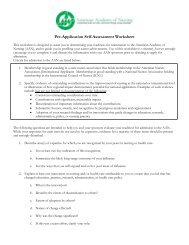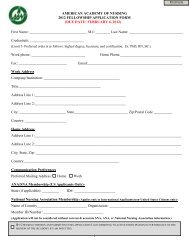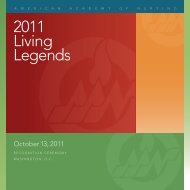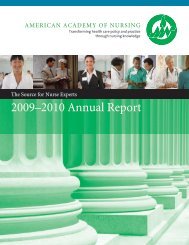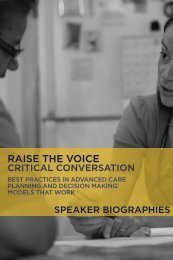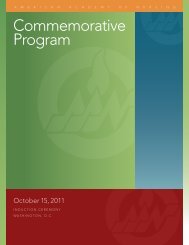brochure (PDF) - American Academy of Nursing
brochure (PDF) - American Academy of Nursing
brochure (PDF) - American Academy of Nursing
Create successful ePaper yourself
Turn your PDF publications into a flip-book with our unique Google optimized e-Paper software.
Promoting Mental Health <strong>of</strong><br />
Older <strong>American</strong>s –<br />
The Work <strong>of</strong> Geropsychiatric Nurses
Knowledge from <strong>Nursing</strong> Research<br />
Geropsychiatric<br />
Mental illness in late-life results from a<br />
mix <strong>of</strong> a person’s own biological make-up,<br />
the nature and impact <strong>of</strong> family and<br />
pivotal – because <strong>of</strong> their unique position,<br />
geropsychiatric nurses (GPNs) can both<br />
translate science into care, and also<br />
Individualized Care<br />
The New England Journal <strong>of</strong> Medicine<br />
social relationships, and environmental<br />
influences. Geropsychiatric nurse<br />
researchers are actively investigating all <strong>of</strong><br />
these areas. A review <strong>of</strong> the work <strong>of</strong><br />
urge basic and clinical scientists in<br />
diverse pr<strong>of</strong>essions to take into account<br />
the insights and specialized needs <strong>of</strong><br />
older adults.<br />
reported that medications commonly geropsychiatric nurse scientists identified<br />
used to treat aggression and agitation in<br />
Today, GPN-conducted studies<br />
their involvement in 17 broad areas.<br />
patients with Alzheimer’s disease carry<br />
encompass, as examples:<br />
adverse effects that significantly <strong>of</strong>fset Among these were studies <strong>of</strong> delirium<br />
the medications’ benefits. This finding<br />
testified to the timeless value <strong>of</strong><br />
geropsychiatric nursing’s “personenvironment”<br />
framework, which focuses<br />
on helping individuals and providers<br />
create and maintain nurturing and<br />
healthy living spaces. For example GPN<br />
and dementia, pain and sleep problems,<br />
depression and suicide, elder abuse, and<br />
strategies for effectively treating cooccurring<br />
general medical and psychiatric<br />
disorders. Yet gaps remain in nursing<br />
• Use <strong>of</strong> sophisticated molecular,<br />
psychoneuroimmunolgic, and genetic<br />
technologies to determine mechanisms<br />
that explain the effects <strong>of</strong> stress and<br />
the resulting variability in behavior.<br />
studies led to eliminating the oncecommon<br />
practice <strong>of</strong> tying down agitated health problems as substance abuse,<br />
research to address such geriatric mental<br />
• An extensive body <strong>of</strong> nursing research<br />
elders, while devising interventions that<br />
that has examined traits such as<br />
anxiety, serious mental illness, and<br />
support their well-being and dignity.<br />
resourcefulness and ability to take<br />
<strong>Nursing</strong> research identified the<br />
health disparities. More interdisciplinary,<br />
care <strong>of</strong> oneself, which contribute to<br />
shower/bath as an event likely to trigger intervention, dissemination, and translation<br />
agitation and aggression, and<br />
the health <strong>of</strong> older adults, including<br />
research is needed.<br />
demonstrated the benefits <strong>of</strong> towelbathing;<br />
family care-givers.<br />
other nursing-directed studies<br />
The breadth <strong>of</strong> nursing research interests<br />
have found specific non-verbal<br />
• Research that is closing the gap<br />
communication and thermal discomfort and expertise may obscure what perhaps<br />
between what patients and their<br />
as triggers for caregivers to avoid.<br />
is the central and constant theme <strong>of</strong><br />
families are seeking in end-<strong>of</strong>-life care<br />
nursing science: A focus on the person in<br />
Cost-Effective Care<br />
and what <strong>of</strong>ten occurs in the presence<br />
the environment. With its proud history<br />
Medical costs for depressed older adults<br />
<strong>of</strong> advanced technologies.<br />
<strong>of</strong> clinical care, nursing research brings<br />
are 50% higher than for non-depressed<br />
elderly. Depression is, however, <strong>of</strong>ten<br />
undetected and not treated in older<br />
adults receiving skilled home health<br />
care. Geropsychiatric nurses have been<br />
involved in developing low cost, effective<br />
to modern health science a unique<br />
approach to questions that are at the<br />
heart <strong>of</strong> patients’ and their families’ daily<br />
experiences with illness. This focus is<br />
interventions for improving depression<br />
recognition, referral, and patient<br />
outcomes in the home care setting.<br />
Family caregivers <strong>of</strong> older adults with<br />
Alzheimers disease are at risk for<br />
increased morbidity and mortality. GPN<br />
studies have developed cost effective<br />
skill building and lifestyle physical<br />
activity interventions to improve family<br />
caregiver skill and health outcomes.
Putting New Knowledge into Practice<br />
<strong>Nursing</strong><br />
Once found nearly exclusively in hospitals, in a given year, with rates even higher for<br />
masters-prepared GPNs today practice in those aged 75 and older – and GPNs<br />
the varied settings in which older adults <strong>of</strong>ten are the first providers to greet<br />
with mental disorders reside. Foremost them in emergency situations.<br />
among these are nursing homes, where<br />
The adaptability <strong>of</strong> GPNs to diverse care<br />
Access to Care<br />
residents with mental illness and<br />
settings enables them to play a critical role<br />
50%<br />
<strong>of</strong> older adults with mental illness dementia present special clinical<br />
in caring for the nearly one-third <strong>of</strong> homehealth<br />
care patients who need mental<br />
receive NO treatment. Of those who challenges such as confusion, resistance<br />
receive treatment, the vast majority are<br />
to care, communication difficulties,<br />
treated by a Primary Care Provider while<br />
health care services. With the aging <strong>of</strong> the<br />
only a small percentage receive treatment agitation, wandering, sleep disruptions<br />
Nation’s population, nurses also provide<br />
by a Mental Health Specialist.<br />
and resident-to-resident aggression.<br />
care in many non-traditional settings,<br />
Reports reveal high rates <strong>of</strong> mental illness including primary care <strong>of</strong>fices, the criminal<br />
among elders in Assisted Living Facilities justice system and State- and communityrun<br />
homeless health care services.<br />
(ALFs), one <strong>of</strong> the fastest-growing<br />
settings for elder care and which are<br />
Today, 16% <strong>of</strong> psychiatric nurses have<br />
subject to minimal regulation for staff<br />
subspecialty preparation in geriatrics, and<br />
training and health care issues. ALFs are<br />
the field is poised to grow substantially to<br />
a natural context for geropsychiatric<br />
help meet the demands <strong>of</strong> our rapidly aging<br />
nurses, who possess the research-based<br />
society. Ongoing innovations in education,<br />
therapeutic skills to make such settings<br />
credentialing, and practice models reflect<br />
more supportive to all residents,<br />
the priority nursing attaches to the needs <strong>of</strong><br />
regardless <strong>of</strong> health status, so that they<br />
older persons with mental disorders.<br />
can better age in place.<br />
Geropsychiatric nurses play a critical role<br />
in hospital emergency rooms and special<br />
care units. Adults aged 65 and older are<br />
the highest users <strong>of</strong> hospital-based<br />
emergency services in the U.S.; nearly<br />
one quarter <strong>of</strong> all older adults make at<br />
least one emergency department visit
Preparing the GPN Workforce<br />
Depression…<br />
Late life depression is a heterogeneous<br />
disorder that can result from genetic<br />
factors, psychosocial stressors,<br />
medications, or the physiologic effects<br />
<strong>of</strong> disease. Depression can have an<br />
adverse impact on diseases common to<br />
older age, including cancer, stroke,<br />
cardiac disease, neurological disorders,<br />
and diabetes. GPNs are well-trained to<br />
recognize, assess, prevent and treat<br />
depressive illness, thus, substantially<br />
preserving the quality <strong>of</strong> the lives <strong>of</strong><br />
older persons and their families.<br />
… and Health<br />
Many older adults with a mental<br />
disorder also have at least one chronic<br />
general medical disease. GPNs, with<br />
their strong base <strong>of</strong> education in general<br />
health, are exceptionally well-qualified<br />
to assume the role <strong>of</strong> care coordinator<br />
for clients who will need special<br />
attention and guidance through both the<br />
medical and mental healthcare systems.<br />
Geropsychiatric nursing evolved in the<br />
1970s as a blended sub-specialty <strong>of</strong> both<br />
psychiatric nursing, an illness-oriented<br />
specialty, and gerontological nursing,<br />
which focuses more broadly on health<br />
and illness. Today, advanced practice<br />
GPNs possess the broad and deep<br />
knowledge needed both to treat illness<br />
and to promote health and resiliency in<br />
old age in a variety <strong>of</strong> care settings and<br />
across diverse older populations.<br />
The education <strong>of</strong> an advanced practice<br />
nurse in this field begins with a 4-year<br />
baccalaureate degree in nursing and<br />
state licensure as a Registered Nurse<br />
(RN). Nurses then engage in a rigorous<br />
program <strong>of</strong> graduate studies that cover<br />
biobehavioral and pharmacological<br />
sciences; recognition and diagnosis <strong>of</strong><br />
common mental disorders; cognitive,<br />
behavioral, and interpersonal treatments;<br />
research; and other interests such as<br />
communication theory and practice,<br />
consultation, conflict resolution, and<br />
exposure to the ethical and legal issues<br />
unique to the treatment needs <strong>of</strong><br />
older adults.<br />
Efforts are underway to standardize<br />
educational requirements for nurses who<br />
will specialize in this field, and to spread<br />
key skills to nurses broadly. Reflecting<br />
awareness <strong>of</strong> needs in the population,<br />
nurse educators now are integrating<br />
GPN content into related specialties,<br />
including psychiatric nursing as well as<br />
adult/gerontological, family, and women’s<br />
health advanced practice nursing<br />
programs. Urgently needed are strategies<br />
for bringing needed information to already<br />
practicing nurses.<br />
(continued on back page)
Over the next 25 years, the population <strong>of</strong> persons 65-and-older in the United States will<br />
double. In the year 2030, an estimated 71.5 million older adults will account for one-infive<br />
persons in the total population.<br />
Age Trends<br />
2006<br />
Total US population: 298 million<br />
Projected 2030<br />
12.5%<br />
Over age 65:<br />
37 million<br />
Projected US population: 357.5 million<br />
Who We Are<br />
20.0%<br />
Over age 65:<br />
71.5 million<br />
“Geras” is the ancient Greek word for<br />
aged one. Geropsychiatric nurses<br />
(GPNs) combine expertise in modernday<br />
psychiatric practices with<br />
knowledge <strong>of</strong> the changes in health<br />
and illness that accompany aging.<br />
This <strong>brochure</strong> reviews how GPNs –<br />
an advanced practice specialty within<br />
nursing, the largest pr<strong>of</strong>ession in the<br />
U.S. health care delivery system – can<br />
lead, as well as complement, the<br />
activities <strong>of</strong> other medical and social<br />
service providers who are similarly<br />
committed to promoting the quality <strong>of</strong><br />
lives <strong>of</strong> older persons.<br />
In the future, as today, the majority <strong>of</strong> older people will lead vibrant, healthy lives. The<br />
energy and creativity that has come to characterize the so-called baby boom generation is<br />
evident already in housing, recreation, health care, and many other spheres.<br />
Although millions <strong>of</strong> <strong>American</strong>s will thrive as they grow older, the sheer numbers <strong>of</strong><br />
people who will survive to advanced years means, also, a dramatic increase in those<br />
who will experience illnesses and maladies that first occur or worsen in older adulthood.<br />
Health problems will include general medical illnesses, mental health problems, and,<br />
<strong>of</strong>ten, instances in which these co-occur. Add to these the stressors associated with<br />
normal aging – for example, loss <strong>of</strong> loved ones, relocation to unfamiliar surroundings,<br />
and natural declines in physical well-being.<br />
The President’s New Freedom Commission on Mental Health projects that by 2030,<br />
some 20 percent <strong>of</strong> persons over age 65 – about 15 million older men and women – will<br />
have a major psychiatric disorder. As survival to advanced old age becomes more<br />
common, so will devastating conditions such as Alzheimer’s disease, which now affects<br />
nearly half <strong>of</strong> those over age 85. Moreover, certain aspects <strong>of</strong> the “boomer”<br />
generation’s lifestyles, such as greater exposure to excessive alcohol and illicit drug use,<br />
will further challenge the health <strong>of</strong> many individuals as they age.<br />
Meeting the complex health and mental health<br />
care needs <strong>of</strong> older <strong>American</strong>s in the decades<br />
ahead poses an enormous national and societal<br />
challenge – one in which geropsychiatric nurses<br />
have an essential role to play.
Geropsychiatric <strong>Nursing</strong> – Progress, Plans, Prospects and Partners<br />
Educational Resources<br />
The Geropsychiatric <strong>Nursing</strong><br />
Collaborative (GPNC) has posted the<br />
following educational resources<br />
on the Portal <strong>of</strong> Geriatric Online<br />
Education (POGOe) website<br />
(www.pogoe.org/product/20660):<br />
curricular materials, geropsychiatric<br />
nursing competency enhancements,<br />
key concepts, and a definition <strong>of</strong><br />
geropsychiatric nursing.<br />
The GPNC is a project <strong>of</strong> the <strong>American</strong><br />
<strong>Academy</strong> <strong>of</strong> <strong>Nursing</strong> and supported by<br />
the John A. Hartford Foundation<br />
(www.aannet.org/GPNCgeropsych).<br />
<strong>Nursing</strong> contributes significantly to caring for the mental health needs <strong>of</strong> our burgeoning<br />
population <strong>of</strong> older adults and their families. Progress toward making full use <strong>of</strong> the<br />
pr<strong>of</strong>ession will require partnering with advocates and organizations to target three main<br />
areas: further research and knowledge dissemination; training for evidence-based<br />
geropsychiatric nursing practice; and leadership to heighten the visibility and attractiveness <strong>of</strong><br />
the field. Working together, nurses, legislators, and others can achieve the following goals:<br />
• Raise awareness, within nursing and among the public broadly, <strong>of</strong> urgent, unmet<br />
mental health needs among older persons, and use this awareness to recruit nurses<br />
to the specialty;<br />
• Collaborate with pr<strong>of</strong>essional and consumer organizations interested in health care to<br />
leverage activities and resources;<br />
• Garner funds to support nurse scholars’ programs <strong>of</strong> research in mental health and aging;<br />
• Support interdisciplinary centers <strong>of</strong> excellence in geriatric mental health to expand the<br />
science undergirding mental health care;<br />
• Provide models for graduate programs in psychiatric nursing and adult/gerontological,<br />
family, and women’s health advanced practice nursing programs to include core GPN<br />
content and clinical learning experiences;<br />
• Obtain student support for graduate education to enable preparation <strong>of</strong> greater<br />
numbers in the field;<br />
• Develop innovative programs to prepare practicing nurses for providing mental health<br />
services to culturally diverse older adults;<br />
• Introduce evidence-based best geropsychiatric practices into all settings where older<br />
adults receive care;<br />
• Encourage specialty organizations in nursing to incorporate geropsychiatric<br />
competencies in their scopes and standards <strong>of</strong> practice; and<br />
• Challenge and eradicate health disparities in geropsychiatric research, training and<br />
provision <strong>of</strong> mental health services to older adults.<br />
Prepared by the John A. Hartford Centers <strong>of</strong> Geriatric <strong>Nursing</strong> Excellence at<br />
the University <strong>of</strong> Pennsylvania and the University <strong>of</strong> Iowa with support<br />
from the van Ameringen Foundation, the John A. Hartford Foundation, the<br />
National Institute <strong>of</strong> Mental Health, and five John A. Hartford Centers<br />
<strong>of</strong> Geriatric <strong>Nursing</strong> Excellence. Refreshed by the Geropsychiatric<br />
<strong>Nursing</strong> Collaborative, 2011. Detailed reports from a national conference<br />
Geropsychiatric <strong>Nursing</strong>: State <strong>of</strong> the Future can be found in Journal <strong>of</strong><br />
the <strong>American</strong> Psychiatric Nurses Association, 12(2 & 3), 2006.



